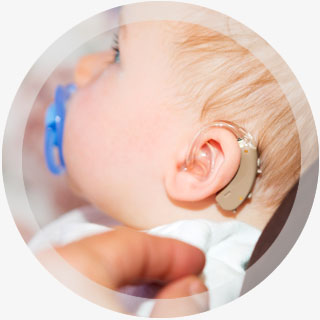Children with Hearing Loss
How common is hearing loss with children?
32 million children around the world are affected with hearing loss. Approximately 1.4 to 5 out of every 1000 children are born with hearing loss, while 60% are due to preventable causes.
Childhood hearing loss is often identified during newborn hearing screenings that are performed 24-48 hours after birth. However, some children who pass these screenings show signs of loss, as they grow older.
Hearing loss and development with children
Research supports that hearing is essential to speech and language development, communication and learning. Children with hearing loss are at risk for developmental delays in areas of receptive and expressive communication skills and often experience learning difficulties, reduced academic achievement and difficulties with communicating and socializing with their family and peers.
Immediate intervention required
Hearing loss should be addressed immediately after it is suspected and/or diagnosed. Continued exposure to speech, language and other stimuli in his or her environment is critical. Research shows early identification and intervention helps children with hearing loss develop language (spoken and/or signed) as well as their normal hearing peers and will ultimately have less impact on the child’s developmental milestones.
Hearing solutions for children
Early identification and intervention is critical and allows professionals to work with families to educate them on how to support their child’s communication and developmental needs. Your hearing care professional will assess your child’s hearing and guide you through the next steps. Depending on the type and severity of your child’s hearing loss, interventions may include a combination of the following:
- Hearing aid technology– electronic device worn on the ear to amplify sound
- Cochlear implants - surgically implanted devices that directly stimulate the auditory nerve in the inner ear with electrical stimulation
- Speech therapy - therapeutic instruction designed to improve language development and communication.
- Assistive hearing devices - technology that helps transmit sounds directly to a child’s hearing aids and/or cochlear implants
Hearing aids and accessories for children
As a parent of a child with hearing loss, it is important to understand that hearing happens in the brain, not the ears. The ears help sound reach the brain and as such, can be considered 'the doorways to the brain'.

BOOK A CONSULTATION